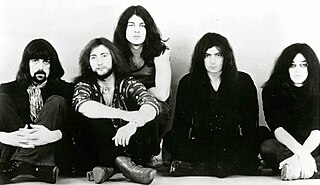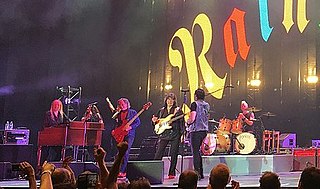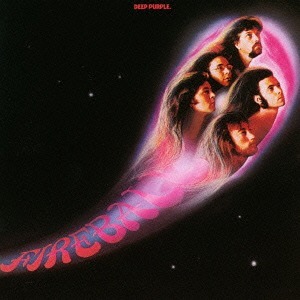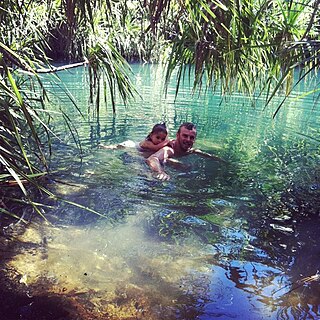
Deep Purple are a British rock band formed in London in 1967. They are considered to be among the pioneers of heavy metal and modern hard rock, but their musical approach has changed over the years. Originally formed as a psychedelic rock and progressive rock band, they shifted to a heavier sound with their 1970 album Deep Purple in Rock. Deep Purple, together with Led Zeppelin and Black Sabbath, have been referred to as the "unholy trinity of British hard rock and heavy metal in the early to mid-seventies". They were listed in the 1975 Guinness Book of World Records as "the globe's loudest band" for a 1972 concert at London's Rainbow Theatre and have sold over 100 million albums worldwide.

Susan Jane Blackmore is a British writer, lecturer, sceptic, broadcaster, and a visiting professor at the University of Plymouth. Her fields of research include memetics, parapsychology, consciousness, and she is best known for her book The Meme Machine. She has written or contributed to over 40 books and 60 scholarly articles and is a contributor to The Guardian newspaper.

Ronald James Padavona, known professionally as Ronnie James Dio, was an American heavy metal singer. He fronted and founded numerous bands throughout his career, including Elf, Rainbow, Black Sabbath, Dio and Heaven & Hell.

Rainbow are a British/American rock band formed in London and Los Angeles in 1975 by guitarist Ritchie Blackmore. Established in the aftermath of Blackmore's first departure from Deep Purple, they originally featured four members of the band Elf, including their singer Ronnie James Dio, but after their self-titled debut album, Blackmore fired these members, except Dio, recruiting drummer Cozy Powell, bassist Jimmy Bain and keyboardist Tony Carey. This line-up recorded the band's second album Rising (1976), while Long Live Rock 'n' Roll (1978) saw Bob Daisley and David Stone replace Bain and Carey, respectively. Long Live Rock 'n' Roll was also the last album with Dio before he left the band to join Black Sabbath in 1979.

"Smoke on the Water" is a song by English rock band Deep Purple, released on their 1972 studio album Machine Head. The song's lyrics are based on true events, chronicling the 1971 fire at Montreux Casino in Montreux, Switzerland. It is considered the band's signature song and the guitar riff is considered to be one of the most iconic.

Candice Night is an American singer and musician. She has been the vocalist/lyricist and multi-instrumentalist for the traditional folk rock project Blackmore's Night since its origins in 1997 with her husband, guitarist Ritchie Blackmore. She is also the backing vocalist for Rainbow from 1994 to 1997 and 2015–present, again with Blackmore. Her first solo album, Reflections, was released in 2011.

Fireball is the fifth studio album by English rock band Deep Purple, released in 1971 as the second album with the Mark II line-up, consisting of Ritchie Blackmore, Ian Gillan, Roger Glover, Jon Lord and Ian Paice. It was recorded at various times between September 1970 and June 1971. It became the first of the band's three UK No. 1 albums, though it did not stay on the charts as long as its predecessor, Deep Purple in Rock. Even though the album has sold over a million copies in the UK, it has never received a certification there.

The Litchfield Council is a local government area of the Northern Territory of Australia on the eastern and southeastern outskirts of the Darwin-Palmerston urban area. The municipality covers an area of 2,903 square kilometres (1,120.9 sq mi), and was created by the Northern Territory government on 6 September 1985.

Richard Hugh Blackmore is an English guitarist and songwriter. He was a founding member and the lead guitarist of Deep Purple, playing jam-style hard rock music that mixed guitar riffs and organ sounds. He is prolific in creating guitar riffs and has been known for playing both classically influenced and blues-based solos.
Blackmore is a village in Essex, England.
James Richard "Richie" Blackmore is a rugby league coach, and former professional footballer who represented New Zealand. His position of preference was as a centre.

Berry Springs is a locality in the Northern Territory of Australia. The locality is a mostly rural area situated on the Cox Peninsula Road and is sparsely populated. A few businesses and a school are located in the locality. In the 2016 census, the population of Berry Springs was 818. It is located 58.5 kilometres (36.4 mi) by road from the Darwin Central Business District and lies within the Litchfield Municipality local government area.
Winston Blackmore is the leader of a polygamous Fundamentalist Latter Day Saint religious group in Bountiful, British Columbia, Canada. He is described as "Canada's best-known avowed polygamist". He has 420 children with his 40 "spiritual" wives, some of whom he has admitted were underage.

Rising is the second studio album by the British-American rock band Rainbow. It was released on 17 May 1976.
Blackmores Limited is an Australian health supplements company founded in 1938 by naturopath Maurice Blackmore (1906–1977), when Blackmore opened the first health food shop in Australia in Brisbane. It manufactures an extensive range of vitamin, mineral and herbal supplements, sold in 17 markets across the Asia Pacific region.
Micket Creek is a locality in the Northern Territory of Australia located about 12 kilometres (7.5 mi) east of the territory capital of Darwin.
Daly is a locality in the Northern Territory of Australia located about 51 kilometres (32 mi) south-east of the territory capital of Darwin.
Weddell is a locality in the Northern Territory of Australia located about 24 kilometres (15 mi) south-east of the territory capital of Darwin City.
Rachael Blackmore MBE is an Irish jockey who competes in National Hunt racing. In 2021, she became the first female jockey to win the Grand National in the 182-year history of the race. She also became the first woman to be leading jockey at the Cheltenham Festival with six victories, including the Champion Hurdle, in 2021. The following year she became the first female jockey to win the Cheltenham Gold Cup.












